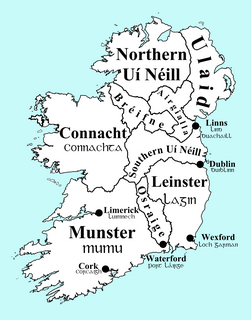See also
Variations on the surname:
McEnaney is a surname of Irish origin. Notable people with the surname include:
Variations on the surname:
McSweeney is a surname of Norse-Gaelic origin. It is the Anglicized form of the Gaelic Mac Sween or Swein, meaning "son of Suibhne". Despite claims that the personal name Suibhne is of Irish origin and derived from suibneus, suaimhneas, meaning "easy-going", or "pleasant", the eponymous ancestor of the McSweeneys was of Norse-Gaelic descent. According to the Annals of Tigernacht, Swein, Son of Cinaid (Kenneth), King of the Gal-Gaidhil, Died 1034 AD. Claims of the McSweeneys being of Irish origin and descendants of the O'Neills are entirely false and would appear to have been made up for two purposes - firstly to smooth their way into medieval Tyr Connail, where they conquered territory and became kingmakers, protectors and fosterers to the O'Donnells, who ruled that part of Ireland, and secondly, so it wouldn't appear that the O'Neills were having to rely on foreigners to do their fighting for them - especially as the 'cessing' of galoglas
McCaffrey, sometimes spelled Caffrey or McCaffery, is an Irish surname. It is found mostly in the Counties Fermanagh, Monaghan, Cavan and Tyrone in the north west of Ireland. Ballymccaffrey is a townland outside Tempo in county Fermanagh. The surname is an Anglicised form of the Gaelic names Mac Gafraidh, Mac Gofraidh, which mean "son of Gafraidh", "son of Gofraidh". The Gaelic names are forms of the Old Norse Guðfróðr. Notable people with the surname include:

McGowan is an Irish surname. It is an Anglicization of the Irish Mac Gabhann and Scottish surname Mac Gobhann. Belonging to the Uí Echach Cobo, located in modern-day County Down in the east of Ulster, they produced several over-kings of Ulaid. By the late 12th century, the English had expelled the McGowans to Tír Chonaill in the west of Ulster.
McElwain or McElwaine is a surname of Celtic origin. It can be derived from either Scottish or Irish. The Scottish translation being the anglicized form of Gaelic Mac Gille Bheathain, meaning ‘son of the servant of (Saint) Beathan’ and also a personal name representing a diminutive of beatha ‘life’. The Irish form being the anglicised form of Gaelic Mac Giolla Bháin, meaning ‘son of the white-haired lad’. In Ulster this surname can be derived to be the Scottish form as opposed to the Irish form which would be more common in the Republic of Ireland. Another anglicised version of the Irish "Mac Giolla Bháin" is the surname Kilbane.
McGuigan is a Gaelic surname of Irish origin. Notable people with the surname include:
McKillop is an English language surname derived from the Gaelic MacFhilib, meaning "son of Filib".
The surnames MacGavin and McGavin are Scottish surnames, which are possibly variations of the surnames McGowan and MacGowan, which are Anglicised forms of the Scottish Gaelic MacGobhann and Irish Gaelic Mac Gabhann, meaning "son of the smith". When the surname MacGavin and McGavin originate from Glasgow and Moray, they can be represented in Scottish Gaelic as Mac a' Ghobhainn.
Banti is an Italian surname. It may refer to:
McEneaney is a surname. Notable people with the surname include:
McEntee is an Irish surname. Notable people with the surname include:
McEvoy is an Irish surname. Notable people with the surname include:
McGettigan is an Irish surname found in County Donegal, Republic of Ireland and County Londonderry, Northern Ireland. They were a sept of the Clan Diarmaid of the Cenél nEógain branch of the Northern Uí Néill. Notable people with the surname include:
McGinley is an Irish surname. Notable people with the surname include:
McGoldrick is a surname. Notable people with the surname include:
McGourty is a surname. Notable people with the surname include:
McManamon is a surname. Notable people with the surname include:
McMenamin is an Irish surname. In Gaelic it is rendered, Mac Meanman, meaning 'son of Meanma' a name meaning courageous or high spirited. It originated in Co. Donegal in the 13th century. The first written mention of the name is in 1303 in the 'Annals of Loch Cé' which records the deaths of Donnchadh Mac Meanman and Aedh Mac Meanman, grandsons of the Lector O'Domnhaill, the chieftain of Fanad, during a dynastic struggle within the Cenél Conaill. The McMenamins are a branch of the O'Donnells of Tyrconnell (Donegal) and are part of the Sil Lugdach, descendants of Lugaid mac Sétnai, the great-grandson of Conall Gulban. Like many discarded branches of noble families, the McMenamins sought advancement in the church evidenced by numerous mentions of McMenamin prelates in papal letters from the late 1300s to the late 1400s. They were supplanted in their home territory of Fanad by the Sweeneys and over the centuries became more distantly related to the royal line of the Cenél Conaill. One scholar describes the family as "...a discarded branch of the O'Donnell dynasty"
McAdam or MacAdam is a Scottish Gaelic clan which originated as a branch of Clan Gregor. As a surname it is most prominent in the Galloway and Ayrshire regions of Scotland. Some of their descendants are also to be found in Ireland, the United States, Australia and Canada.
McAnaney is a surname. Notable people with the surname include:
McEnany is a surname of Irish origin